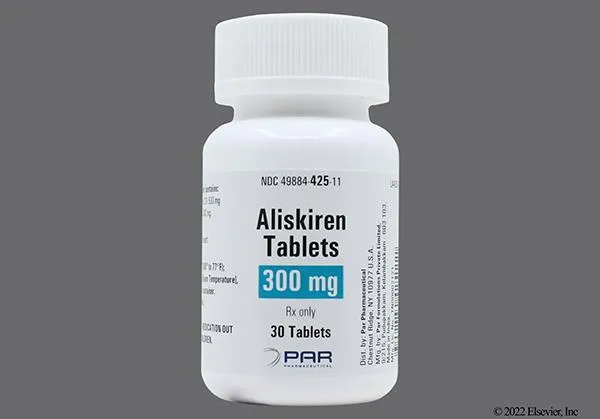Comprehensive Guide to Aliskiren: Uses, Dosage, Side Effects, and More
What is Aliskiren?
Overview of Aliskiren
Generic Name: Aliskiren
Brand Name: Tekturna (USA), Rasilez (Europe), generics
Drug Group: Direct renin inhibitor; antihypertensive
The medication is used to:
- Treat essential hypertension in adults, alone or in combination with other antihypertensives.
- Manage hypertension in patients with diabetes or renal impairment (with caution).
- Off-label uses include heart failure or proteinuria reduction in specific cases under specialist guidance.
Key Characteristics
Form: Oral tablets (150 mg, 300 mg).

Mechanism: Inhibits renin, reducing angiotensin II production and lowering blood pressure.
Approval: FDA-approved (2007 for Tekturna) and EMA-approved for hypertension.
Indications and Uses of Aliskiren
Aliskiren is indicated for:
Essential Hypertension: Lowers blood pressure in adults with primary hypertension, either as monotherapy or in combination with other agents (e.g., hydrochlorothiazide).
Combination Therapy: Used with other antihypertensives for patients with resistant hypertension.
Off-Label Uses: Investigated for heart failure or diabetic nephropathy to reduce proteinuria under specialist supervision.
Dosage of Aliskiren
Dosage for Adults
Hypertension:
- Initial: 150 mg once daily.
- Maintenance: 150–300 mg once daily, adjusted based on blood pressure response.
- Maximum: 300 mg/day.
Combination Therapy: 150–300 mg once daily with other antihypertensives (e.g., amlodipine, hydrochlorothiazide).
Dosage for Children
Not approved for pediatric use; safety and efficacy not established.
Dosage for Pregnant Women
Dosage Adjustments
Renal Impairment:
- Mild to moderate (CrCl ≥30 mL/min): No adjustment needed; monitor closely.
- Severe (CrCl <30 mL/min): Use cautiously; limited data.
Hepatic Impairment: No adjustment needed; monitor for side effects.
Elderly: No specific adjustments; monitor for hypotension and renal effects.
Additional Considerations
- Take with or without food; high-fat meals may reduce absorption.
- Monitor blood pressure regularly to assess efficacy and adjust dosing.
How to Use Aliskiren
Administration: Swallow tablets whole with water, with or without food. Avoid high-fat meals to ensure optimal absorption.
Timing: Take once daily at a consistent time to maintain steady blood levels.
Missed Dose: Take as soon as remembered unless it’s nearly time for the next dose; do not double doses. Consult your doctor if multiple doses are missed.
Additional Tips:
- Monitor for signs of low blood pressure (dizziness, fainting).
- Report symptoms like swelling, rash, or reduced urine output immediately.
Contraindications for Aliskiren
The renin inhibitor is contraindicated in:
Patients with hypersensitivity to Aliskiren or its components.
Pregnant women (Category D) due to fetal toxicity.
Patients with diabetes using Aliskiren with ACE inhibitors or ARBs (increased risk of renal impairment, hyperkalemia, and hypotension).
Children (not approved).
Warnings & Precautions for Aliskiren
General Warnings
Fetal Toxicity: Risk of fetal harm in pregnancy; discontinue immediately if pregnancy occurs.
Hypotension: Risk of low blood pressure, especially in volume-depleted patients (e.g., on diuretics); monitor and correct volume status.
Renal Impairment: May worsen kidney function, particularly in patients with pre-existing renal disease or those on ACE inhibitors/ARBs.
Hyperkalemia: Risk of elevated potassium levels; monitor in patients on potassium-sparing diuretics or with renal issues.
Angioedema: Rare; may cause swelling of the face, throat, or tongue; discontinue and seek immediate care.
Use in Specific Populations
Pregnancy: Category D; contraindicated due to risk of fetal renal damage and death.
Breastfeeding: Unknown if excreted in breast milk; avoid or use cautiously with medical advice.
Elderly: Increased risk of hypotension and renal effects; monitor closely.
Children: Not approved; safety not established.
Renal Impairment: Use cautiously in severe cases; monitor kidney function and potassium levels.
Additional Precautions
- Inform your doctor about kidney disease, diabetes, or use of ACE inhibitors/ARBs before starting the medication.
- Avoid potassium supplements or salt substitutes unless prescribed.
Overdose and Management of Aliskiren
Overdose Symptoms
- Severe hypotension (dizziness, fainting).
- Hyperkalemia (muscle weakness, arrhythmias).
- Renal dysfunction (reduced urine output).
Immediate Actions
Contact Emergency Services: Call 911 or seek medical help immediately.
Supportive Care: Administer IV fluids for hypotension; monitor electrolytes and renal function.
Monitor: Check blood pressure, potassium levels, and kidney function.
Additional Notes
- Overdose is rare with proper dosing; store securely to prevent misuse.
- Report persistent symptoms promptly.
Side Effects of Aliskiren
Common Side Effects
- Diarrhea (2–3%)
- Dizziness (2–3%)
- Fatigue (1–2%)
- Nasopharyngitis (1–2%)
- Rash (1%)
These effects are usually mild and may resolve with continued use.
Serious Side Effects
Seek immediate medical attention for:
Cardiovascular: Severe hypotension (fainting, weakness).
Renal: Decreased urine output or swelling (renal impairment).
Metabolic: Muscle weakness or irregular heartbeat (hyperkalemia).
Allergic Reactions: Rash, angioedema, or difficulty breathing.
Additional Notes
- Regular monitoring of blood pressure, kidney function, and potassium levels is essential.
- Report persistent or severe side effects promptly.
Drug Interactions with Aliskiren
The medication may interact with:
ACE Inhibitors/ARBs (e.g., Lisinopril, Losartan): Contraindicated in diabetic patients; increase risk of renal impairment, hyperkalemia, and hypotension.
Potassium-Sparing Diuretics (e.g., Spironolactone): Increase hyperkalemia risk; monitor potassium levels.
NSAIDs (e.g., Ibuprofen): Reduce antihypertensive effect and increase renal risk; use cautiously.
Cyclosporine: Increases Aliskiren levels; avoid or monitor closely.
Furosemide: Reduces furosemide efficacy; monitor diuretic response.
Patient Education or Lifestyle
Medication Adherence: Take Aliskiren consistently as prescribed to maintain blood pressure control. Refill prescriptions early to avoid interruptions.
Monitoring: Monitor blood pressure regularly; report dizziness, swelling, or reduced urine output immediately.
Lifestyle: Follow a low-sodium diet, exercise regularly (30 minutes most days), and avoid smoking to enhance antihypertensive effects.
Diet: Avoid high-fat meals at dosing time; limit potassium-rich foods (e.g., bananas, oranges) unless advised by your doctor.
Emergency Awareness: Carry information about your condition (e.g., hypertension) and medications; know signs of hypotension or angioedema.
Lab Monitoring: Schedule regular blood tests (electrolytes, kidney function) as advised by your doctor.
Pharmacokinetics of Aliskiren
Absorption: Poorly absorbed orally (~2.5% bioavailability); peak plasma concentration at 1–3 hours; reduced by high-fat meals.
Distribution: Volume of distribution 135 L; moderately protein-bound (47–51%).
Metabolism: Minimal hepatic metabolism via CYP3A4; mostly excreted unchanged.
Excretion: Fecal (80%); renal (20% unchanged).
Half-Life: 24–40 hours.
Pharmacodynamics of Aliskiren
The renin inhibitor exerts its effects by:
Directly inhibiting renin, reducing angiotensin I and II production.
Lowering blood pressure by decreasing vasoconstriction and aldosterone secretion.
Reducing plasma renin activity by 50–80%, effective in monotherapy or combination.
Providing sustained antihypertensive effects with once-daily dosing.
Storage of Aliskiren
Temperature: Store at room temperature (20–25°C or 68–77°F); avoid moisture and heat.
Protection: Keep in original container to protect from moisture; ensure child-resistant packaging.
Safety: Store out of reach of children to prevent accidental ingestion.
Disposal: Follow local regulations or consult a pharmacist for safe disposal of unused or expired medication.
Frequently Asked Questions (FAQs)
Q: What does Aliskiren treat?
A: The drug treats high blood pressure (hypertension) in adults.
Q: Can Aliskiren cause low blood pressure?
A: Yes, hypotension is possible; report dizziness or fainting immediately.
Q: Is Aliskiren safe for children?
A: Not approved for pediatric use; safety not established.
Q: Can I take Aliskiren with ACE inhibitors?
A: Contraindicated in diabetic patients; consult your doctor for alternatives.
Q: How long does Aliskiren take to work?
A: Blood pressure reduction begins within days, with full effect in 2–4 weeks.
Regulatory Information
The medication is approved by:
U.S. Food and Drug Administration (FDA): Approved in 2007 (Tekturna) for hypertension.
European Medicines Agency (EMA): Approved as Rasilez for similar indications.
Other Agencies: Approved globally for equivalent uses; consult local guidelines.
References
- U.S. Food and Drug Administration (FDA). (2023). Tekturna (Aliskiren) Prescribing Information.
- Official FDA documentation detailing the drug’s approved uses, dosage, and safety.
- European Medicines Agency (EMA). (2023). Rasilez Summary of Product Characteristics.
- EMA’s comprehensive information on the medication’s indications and precautions in Europe.
- National Institutes of Health (NIH). (2023). Aliskiren: MedlinePlus Drug Information.
- NIH resource providing detailed information on the drug’s uses, side effects, and precautions.
- World Health Organization (WHO). (2023). WHO Model List of Essential Medicines: Aliskiren.
- WHO’s inclusion of Aliskiren for hypertension management.
- Hypertension. (2020). Direct Renin Inhibitors in Hypertension.
- Peer-reviewed article on Aliskiren efficacy (note: access may require a subscription).
